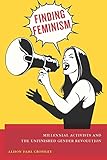Finding Feminism : Millennial Activists and the Unfinished Gender Revolution / Alison Dahl Crossley.
Material type: TextPublisher: New York, NY : New York University Press, [2017]Copyright date: ©2017Description: 1 online resourceContent type:
TextPublisher: New York, NY : New York University Press, [2017]Copyright date: ©2017Description: 1 online resourceContent type: - 9781479898329
- 9781479841264
- 305.42 23
- HQ1155
- online - DeGruyter
| Item type | Current library | Call number | URL | Status | Notes | Barcode | |
|---|---|---|---|---|---|---|---|
 eBook
eBook
|
Biblioteca "Angelicum" Pont. Univ. S.Tommaso d'Aquino Nuvola online | online - DeGruyter (Browse shelf(Opens below)) | Online access | Not for loan (Accesso limitato) | Accesso per gli utenti autorizzati / Access for authorized users | (dgr)9781479841264 |
Browsing Biblioteca "Angelicum" Pont. Univ. S.Tommaso d'Aquino shelves, Shelving location: Nuvola online Close shelf browser (Hides shelf browser)

|

|

|

|

|

|

|
||
| online - DeGruyter Animus : A Short Introduction to Bias in the Law / | online - DeGruyter Shout to the Lord : Making Worship Music in Evangelical America / | online - DeGruyter Modern Albania : From Dictatorship to Democracy in Europe / | online - DeGruyter Finding Feminism : Millennial Activists and the Unfinished Gender Revolution / | online - DeGruyter Girls on the Stand : How Courts Fail Pregnant Minors / | online - DeGruyter Signature Wounds : The Untold Story of the Military's Mental Health Crisis / | online - DeGruyter A Mortuary of Books : The Rescue of Jewish Culture after the Holocaust / |
Frontmatter -- Contents -- Acknowledgments -- 1. Where have all the feminists gone?: millennials and the unfinished gender revolution -- 2. Who needs feminism?: gender inequality and feminist identities -- 3. Multicultural sororities, women’s centers, and the institutional fields of feminist activism -- 4. The bonds of feminism: collective identities and feminist organizations -- 5. Can Facebook be feminist?: online, coalitional, and everyday feminist tactics -- 6. Conclusion -- Appendix. The research -- Notes -- References -- Index -- About the author
restricted access online access with authorization star
http://purl.org/coar/access_right/c_16ec
The contemporary tactics of millennial feminists who are part of an active movement for social changeIn 2014, after a young man murdered six students at the University of California, Santa Barbara, and then killed himself, the news provoked an eye-opening surge of feminist activism. Fueled by the wide circulation of the killer’s hateful manifesto and his desire to exact “revenge” upon young women, feminists online and offline around the world clamored for a halt to such acts of misogyny. Despite the widespread belief that feminism is out-of-style or dead, this mobilization of young women fighting against gender oppression was overwhelming. In Finding Feminism, Alison Dahl Crossley analyzes feminist activists at three different U.S. colleges, revealing that feminism is alive on campuses, but is complex, nuanced, and context-dependent. Young feminists are carrying the torch of the movement, despite a climate that is not always receptive to their claims. These feminists are engaged in social justice organizing in unexpected contexts and spaces, such as multicultural sororities, student government, and online. Sharing personal stories of their everyday experiences with inequality, the young women in Finding Feminism employ both traditional and innovative feminist tactics. They use the Internet and social media as a tool for their activism—what Alison Dahl Crossley calls ‘Facebook Feminism.’ The university, as an institution, simultaneously aids and constrains their fight for gender equality. Offering a stunning and hopeful portrait of today’s young feminist leaders, Finding Feminism provides insight into the contemporary feminist movement in America.
Mode of access: Internet via World Wide Web.
In English.
Description based on online resource; title from PDF title page (publisher's Web site, viewed 06. Mrz 2024)


